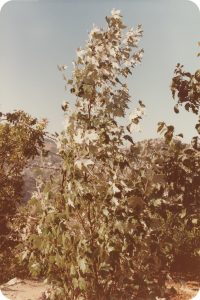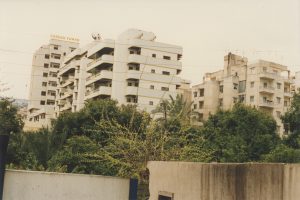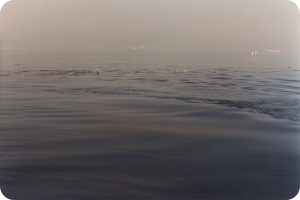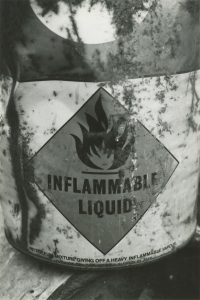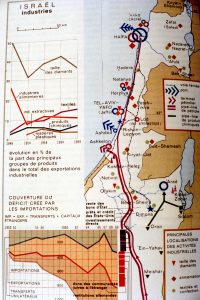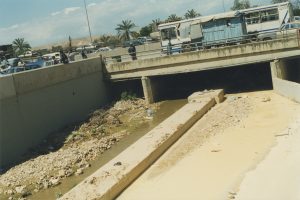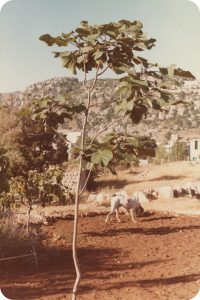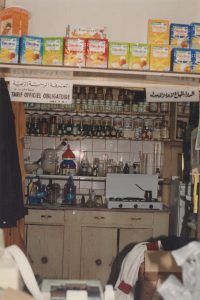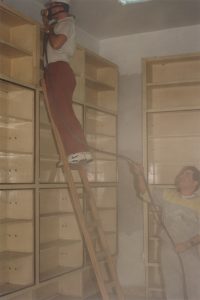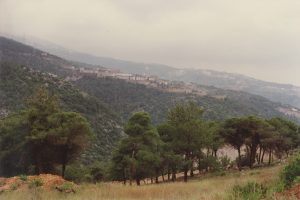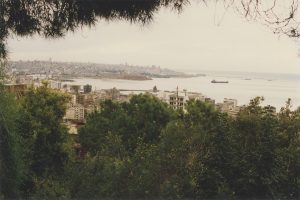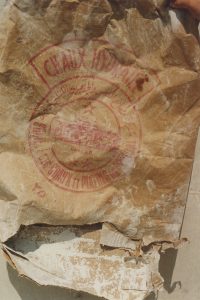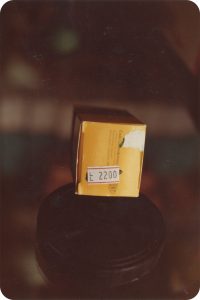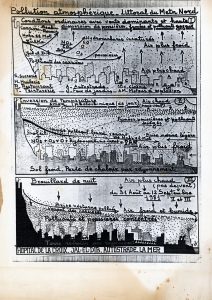
Pierre Malychef

Media Type
Photograph
Content
Beach
Powerplant
Railway
Container
Album
Theme
Electricity
Energy
Author
Pierre Malychef
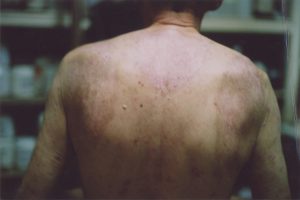
Media Type
Photograph
Container
Envelope
Theme
Symptom(s)
Toxic Waste
Author
Pierre Malychef
Documentation of symptoms resulting from exposure to toxic waste.

Media Type
Photograph
Content
Barrel
Container
Album
Theme
Toxic Waste
Author
Pierre Malychef
According to the label, this barrel contained diphenylmethane-4,4'-diisocyanate (MDI), a light yellow-colored solid. It is not soluble in water. It may be toxic by ingestion, inhalation, or skin absorption; acute (short-term) inhalation of high concentrations of MDI may cause sensitization and asthma in humans. If in a solution it may or may not burn depending on the nature of the material and/or the solvent. It is used to produce polyurethane foams.
The next picture (probably of the front label) indicates that the content of the barrel is related to polyurethanes, produced by the British chemical company, Imperial Chemical Industries (ICI). The barrel may be related to the toxic waste deal between the Italian mafia and the Lebanese Forces through its Italian division, Atlas Europol s.p.A. From 1982 till 1987, the chairman of the company was Sir John Harvey-Jones, a British naval commander during World War II and a naval intelligence specialist post-World War II, whose approach to the chemical business was focused on speed, more power into fewer hands, and high profit.
The barrel is rusted and has seashells growing on it, signs that it was submerged in seawater for a certain period of time.
The image was taken by Pierre Malychef in the late 1980s.

Media Type
Photograph
Content
Barrel
Container
Residential
Container
Envelope
Theme
Field Research
Toxic Waste
Author
Pierre Malychef
Inspection of containers containing barrels of toxic waste, kept in a parking lot near the highway in Antelias amidst residential and commercial buildings.
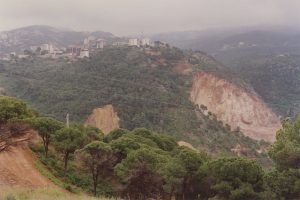
Media Type
Photograph
Content
Residential
Container
Envelope
Theme
Landscape
Quarry
Author
Pierre Malychef

Media Type
Photograph
Content
Residential
Container
Envelope
Theme
Landscape
Quarry
Author
Pierre Malychef

Media Type
Photograph
Content
Barrel
Container
Album
Theme
Toxic Waste
Author
Pierre Malychef
Blue gallons containing residual products from chemical industries as indicated by their label that also reads in Spanish "M.L.S.A. via Puerto Cabello", a town in Venezuela. We couldn’t find more information around the sources, and whether they were related to the Italian toxic waste trade brought to Lebanon through a deal between the Italian mafia and Lebanese Forces. The image was taken by Pierre Malychef in the late 1980s.

Media Type
Photograph
Content
Residential
Smoke
Container
Album
Theme
Landscape
Quarry
Author
Pierre Malychef

Media Type
Photograph
Container
Envelope
Theme
Land Reclamation
Author
Pierre Malychef
Land reclamation project in Dbayeh under development. Currently known as Waterfront City Dbayeh.
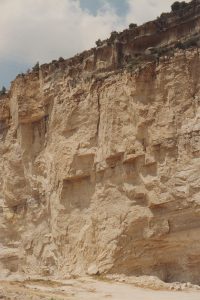
Media Type
Photograph
Container
Envelope
Theme
Quarry
Toxic Waste
Author
Pierre Malychef
Chnaniir gravel and sand quarry

Media Type
Photograph
Content
Barrel
Container
Album
Theme
Toxic Waste
Author
Pierre Malychef
Close-up of a barrel.
We couldn’t find more information around the sources, and whether they were related to the Italian toxic waste trade brought to Lebanon through a deal between the Italian mafia and Lebanese Forces. The image was taken by Pierre Malychef in the late 1980s.

Media Type
Photograph
Container
Album
Author
Pierre Malychef
Image taken by Dr. Pierre Malychef documenting the 1989 Dora Port Explosion and its aftermaths on March 30th 1989. For more information on the explosion, please go to: https://dark.society.systems/contribution/a-history-of-ammonia/

Media Type
Photograph
Container
Album
Author
Pierre Malychef
Image taken by Dr. Pierre Malychef documenting the 1989 Dora Port Explosion and its aftermaths on March 30th 1989. For more information on the explosion, please go to: https://dark.society.systems/contribution/a-history-of-ammonia/

Media Type
Photograph
Container
Album
Author
Pierre Malychef
Image taken by Dr. Pierre Malychef documenting the 1989 Dora Port Explosion and its aftermaths on March 30th 1989. For more information on the explosion, please go to: https://dark.society.systems/contribution/a-history-of-ammonia/

Media Type
Photograph
Container
Album
Author
Pierre Malychef
Image taken by Dr. Pierre Malychef documenting the 1989 Dora Port Explosion and its aftermaths on March 30th 1989. For more information on the explosion, please go to: https://dark.society.systems/contribution/a-history-of-ammonia/
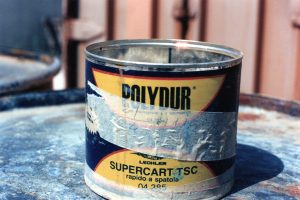
Media Type
Photograph
Content
Barrel
Container
Album
Theme
Toxic Waste
Author
Pierre Malychef
An empty can of "Lechler 04 380 Polydur Zinc Putty", a universal knifing polyester putty of medium grain with very high filling power. Suitable to fill big imperfections on normal steel sheets and zinc coated steel sheets of car bodies and industrial vehicles. Produced by Ponte Chiasso (Como), the Italian subsidiary of the German paint company, Lechler. Ponte Chiasso gained its independence from its parent company, Lechler, in 1910. This can ended up on Lebanese territories due the toxic waste deal between the Italian Mafia and the Lebanese Forces. This image was taken by Pierre Malychef in the late 1980s.
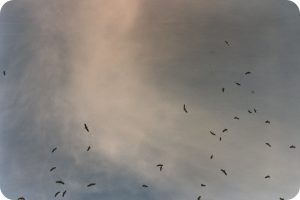
Media Type
Photograph
Container
Album
Author
Pierre Malychef
Image taken by Dr. Pierre Malychef documenting the 1989 Dora Port Explosion and its aftermaths on March 30th 1989. Birds seem to be flying in panic. For more information on the explosion, please go to: https://dark.society.systems/contribution/a-history-of-ammonia/

Media Type
Photograph
Container
Envelope
Theme
Land Reclamation
Author
Pierre Malychef
Land reclamation project in Dbayeh under development. Currently known as Waterfront City Dbayeh.

Media Type
Photograph
Container
Envelope
Theme
Quarry
Toxic Waste
Author
Pierre Malychef
Chnaniir gravel and sand quarry, May 1995. The earth is contaminated due to the storing of toxic waste in the quarry years before, making the extracted material unsuitable for building.

Media Type
Photograph
Container
Envelope
Theme
Land Reclamation
Author
Pierre Malychef
Land reclamation project in Dbayeh under development. Currently known as Waterfront City Dbayeh.

Media Type
Photograph
Content
Beach
Power Station
Container
Envelope
Theme
Electricity
Energy
Author
Pierre Malychef

Media Type
Photograph
Content
Highway
Powerplant
Vehicle
Container
Album
Theme
Electricity
Energy
Industry
Author
Pierre Malychef

Media Type
Photograph
Content
Barrel
Container
Album
Theme
Toxic Waste
Author
Pierre Malychef
An rusted, empty barrel of toxic waste.
We couldn’t find more information around the sources, and whether they were related to the Italian toxic waste trade brought to Lebanon through a deal between the Italian mafia and Lebanese Forces. The image was taken by Pierre Malychef in the late 1980s.
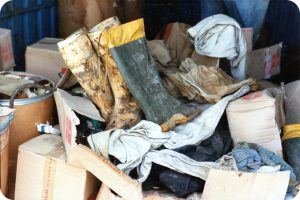
Media Type
Photograph
Content
Waste
Container
Folder
Sub-envelope
Theme
Toxic Waste
Author
Pierre Malychef

Media Type
Photograph
Container
Album
Author
Pierre Malychef
Image taken by Dr. Pierre Malychef documenting the 1989 Dora Port Explosion and its aftermaths on March 30th 1989. Birds seem to be flying in panic. For more information on the explosion, please go to: https://dark.society.systems/contribution/a-history-of-ammonia/

Media Type
Photograph
Container
Envelope
Theme
Field Research
Quarry
Toxic Waste
Author
Pierre Malychef

Media Type
Photograph
Container
Envelope
Theme
Environment
Field Research
Militia
Portrait
Author
Pierre Malychef
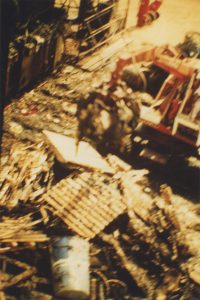
Media Type
Image
Photograph
Reference
Content
Barrel
Port
Container
Envelope
Theme
Field Work
Toxic Waste
Author
Pierre Malychef
A tractor shovel moving piles of toxic waste barrels.
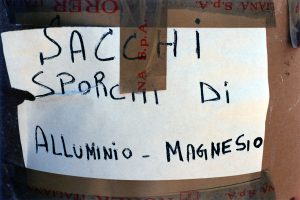
Media Type
Photograph
Content
Barrel
Container
Album
Theme
Toxic Waste
Author
Pierre Malychef
Close-up of a barrel with a sheet of paper taped to it on which it is handwritten in Italian "SACCHI SPORCHI Di ALLUMINIO - MAGNESIO" ("Dirty aluminum - magnesium bags"). The duct tape that is securing the sheet of paper on the barrel is labeled "RORER ITALIANA S.p.A." with the logo of RORER. The latter focuses on the production of organic fine chemistry, pharmaceuticals, machines, and macromolecular chemistry and polymers. The last patent published by the company was on April 2, 1987. Read more on: https://goodip.io/iq/assignee/rorer-italiana-spa#patents.
This lid ended up on Lebanese territories due the toxic waste deal between the Italian Mafia and the Lebanese Forces. This image was taken by Pierre Malychef in the late 1980s.

Media Type
Photograph
Container
Album
Author
Pierre Malychef
Image taken by Dr. Pierre Malychef documenting the 1989 Dora Port Explosion and its aftermaths on March 30th 1989. For more information on the explosion, please go to: https://dark.society.systems/contribution/a-history-of-ammonia/

Media Type
Photograph
Content
Barrel
Power Station
Container
Envelope
Theme
Electricity
Energy
Author
Pierre Malychef
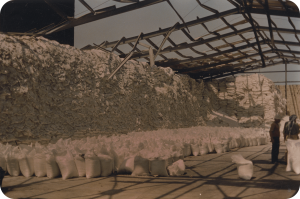
Media Type
Photograph
Container
Album
Theme
Ammonium Nitrate
Marine Pollution
Military
War
Weapon
Author
Pierre Malychef
Image taken by Dr. Pierre Malychef documenting the 1989 Dora Port Explosion and its aftermaths on March 30th 1989. For more information on the explosion, please go to: https://dark.society.systems/contribution/a-history-of-ammonia/ The photograph shows workers in a destitute hangar with a pressure-torn roof post-explosion. Similarly to Hangar 12, the hangar is filled with white sacks, akin to the ammonium nitrate sacks we all became familiar with in the last 3 years. A huge number of the sacks in the upper left part of the image are molten, due to the heat of the explosion.

Media Type
Photograph
Content
Smoke
Container
Album
Theme
Atmospheric
Atmospheric Pollution
Damage
Ecology
Energy
Explosion
Military
War
Author
Pierre Malychef
Image taken by Dr. Pierre Malychef documenting the 1989 Dora Port Explosion and its aftermaths on March 30th 1989. For more information on the explosion, please go to: https://dark.society.systems/contribution/a-history-of-ammonia/

Media Type
Image
Photograph
Reference
Content
Sea
Container
Envelope
Theme
Toxic Waste
Author
Pierre Malychef

Media Type
Photograph
Container
Album
Theme
Field Research
Quarry
Toxic Waste
Author
Pierre Malychef

Media Type
Photograph
Container
Album
Author
Pierre Malychef
Image taken by Dr. Pierre Malychef documenting the 1989 Dora Port Explosion and its aftermaths on March 30th 1989. For more information on the explosion, please go to: https://dark.society.systems/contribution/a-history-of-ammonia/

Media Type
Photograph
Content
Barrel
Container
Envelope
Theme
Field Research
Toxic Waste
Author
Pierre Malychef
Barrels containing toxic waste fall on the side of the road in Maameltein area while being transported to the port of Beirut, spilling their contents.

Media Type
Photograph
Container
Envelope
Theme
Land Reclamation
Author
Pierre Malychef
Land reclamation project in Dbayeh under development. Currently known as Waterfront City Dbayeh.

Media Type
Photograph
Content
Electric Pole
Container
Envelope
Theme
Electricity
Energy
Public Works
Author
Pierre Malychef
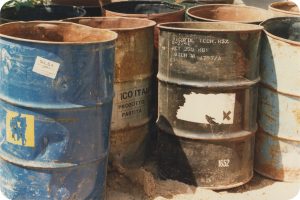
Media Type
Photograph
Content
Barrel
Container
Album
Theme
Toxic Waste
Author
Pierre Malychef
Image taken by Pierre Malychef of a group of barrels from the ca. 15,800 barrels carrying the toxic waste trade. Some of the worn barrels contained Dicofol, a highly toxic pesticide whose production and use are banned internationally under the Stockholm Convention. Dicofol is a nerve poison that can also lead to skin and eye toxic reactions in humans and endamage the fertility of several birds, reptiles, aquatic invertebrates and algae. Since Dicofol can be stored in fatty tissues, intense activity or starvation may re-catalyze the chemical, resulting in the reappearance of toxic symptoms long after actual exposure.

Media Type
Photograph
Content
Residential
Container
Envelope
Theme
Landscape
Quarry
Author
Pierre Malychef

Media Type
Photograph
Content
Residential
Smoke
Container
Album
Theme
Landscape
Quarry
Author
Pierre Malychef
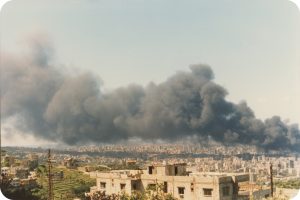
Media Type
Photograph
Container
Album
Author
Pierre Malychef
Image taken by Dr. Pierre Malychef documenting the 1989 Dora Port Explosion and its aftermaths on March 30th 1989. For more information on the explosion, please go to: https://dark.society.systems/contribution/a-history-of-ammonia/

Media Type
Photograph
Content
Barrel
Container
Album
Theme
Toxic Waste
Author
Pierre Malychef
A barrel of what appears to be like polyester resin, produced in Italy by SIRIC, a company whose main activity was the production of unsaturated polyester resins, about 12,000 tons per year, used for fiberglass boats, fiberglass products and artificial marble. The factory has been closed since the 1980s, but investigations and reclamation continued due to the spilling of dangerous materials into the ground and the subsequent discovery of underground deposit of poisonous waste on February 14, 1992. This barrel ended up on Lebanese territories due the toxic waste deal between the Italian Mafia and the Lebanese Forces. This image was taken by Pierre Malychef in the late 1980s. Read more on: https://www.giornaletrentino.it/cronaca/trento/bonifica-siric-si-sgomberano-i-terreni-1.979797.

Media Type
Photograph
Content
Pylon
Container
Envelope
Theme
Electricity
Energy
Quarry
Author
Pierre Malychef
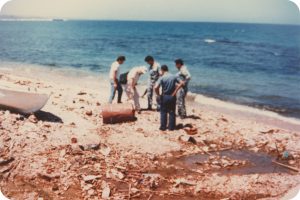
Media Type
Photograph
Content
Barrel
Beach
Sea
Container
Envelope
Theme
Field Research
Toxic Waste
Author
Pierre Malychef

Media Type
Photograph
Content
Port
Ship
Container
Folder
Theme
Toxic Waste
Author
Pierre Malychef
A worker washing away toxic waste spilled at the fifth basin of the port of Beirut during the process of loading them onto the ship.

Media Type
Photograph
Content
Barrel
Port
Container
Envelope
Theme
Toxic Waste
Author
Pierre Malychef
Toxic waste barrels in the port of Beirut.
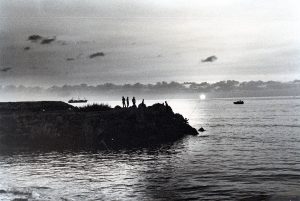
Media Type
Photograph
Content
Sea
Container
Album
Theme
Landscape
Author
Pierre Malychef
People fishing on the coast of Zouk Mosbeh, near the Zouk Thermal Power Plant.

Author
Pierre Malychef
Image taken by Dr. Pierre Malychef documenting the 1989 Dora Port Explosion and its aftermaths on March 30th 1989. For more information on the explosion, please go to: https://dark.society.systems/contribution/a-history-of-ammonia/

Media Type
Note(s)
Photograph
Content
Station
Container
Envelope
Theme
Damage
Water
Author
Pierre Malychef

Media Type
Photograph
Content
Construction Site
Container
Envelope
Theme
Landscape
Author
Pierre Malychef
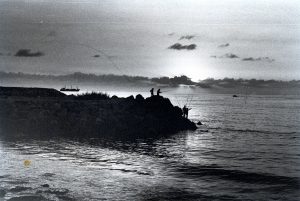
Media Type
Photograph
Content
Sea
Container
Album
Theme
Landscape
Author
Pierre Malychef
People fishing on the coast of Zouk Mosbeh, near the Zouk Thermal Power Plant.

Media Type
Photograph
Container
Album
Author
Pierre Malychef
Image taken by Dr. Pierre Malychef documenting the 1989 Dora Port Explosion and its aftermaths on March 30th 1989. For more information on the explosion, please go to: https://dark.society.systems/contribution/a-history-of-ammonia/

Media Type
Photograph
Theme
Ammonium Sulfate
Atmospheric Pollution
Ecology
Energy
Environment
Military
Militia
War
Author
Pierre Malychef
A photograph we developed from a roll of negatives found in the domestic laboratory of ecotoxicologist, herbal pharmacologist and environmental activist Dr. Pierre Malychef. Malychef has written on the envelope’s roll “INCENDIE DORA” showing images that were all taken on the March 30th, 1989, documenting the dark grey smoke, molten oil and gas tanks. For more information on the explosion, please go to: https://dark.society.systems/contribution/a-history-of-ammonia/

Media Type
Photograph
Content
Barrel
Container
Album
Theme
Toxic Waste
Author
Pierre Malychef
Blue barrel from the Italian toxic waste trade, belonging to Comochem International, the Italian division of Morton Thiokol company. The Morton Thiokol Chemical Company was an American corporation founded in 1929. It was concerned initially with rubber and related chemicals, and later with rocket and missile propulsion systems. We wonder if the Thiokol Space Shuttle Challenger Disaster that befell in January 28, 1986 – despite prior warnings from engineers – could be in one way or another related to this waste. For more information, please refer to: https://onlineethics.org/cases/ethical-decisions-morton-thiokol-and-space-shuttle-challenger-disaster-introduction.

Media Type
Photograph
Container
Envelope
Theme
Land Reclamation
Author
Pierre Malychef
Land reclamation project in Dbayeh under development. Currently known as Waterfront City Dbayeh.

Media Type
Image
Photograph
Reference
Content
Barrel
Container
Port
Container
Envelope
Theme
Field Research
Toxic Waste
Author
Pierre Malychef
Containers and barrels containing toxic waste being kept at the port of Beirut, awaiting to be transported back to Italy.
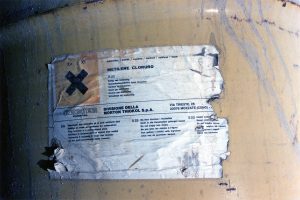
Media Type
Photograph
Content
Barrel
Container
Album
Theme
Toxic Waste
Author
Pierre Malychef
A barrel of methylene chloride, also called dichloromethane, a volatile, colorless liquid with a chloroform-like odor. Methylene chloride is used in various industrial processes, in many different industries including paint stripping, pharmaceutical manufacturing, paint remover manufacturing, and metal cleaning and degreasing. The most common means of exposure to methylene chloride is inhalation and skin exposure. It is considered to be a potential occupational carcinogen.
Produced by Comochem International, the Italian division of Morton Thiokol company. The Morton Thiokol Chemical Company was an American corporation founded in 1929. It was concerned initially with rubber and related chemicals, and later with rocket and missile propulsion systems. We wonder if the Thiokol Space Shuttle Challenger Disaster that befell in January 28, 1986 – despite prior warnings from engineers – could be in one way or another related to this waste. For more information, please refer to: https://onlineethics.org/cases/ethical-decisions-morton-thiokol-and-space-shuttle-challenger-disaster-introduction.

Media Type
Photograph
Content
Barrel
Container
Album
Theme
Toxic Waste
Author
Pierre Malychef
According to the label, the content of this barrel is related to polyurethanes, produced by the British chemical company, Imperial Chemical Industries (ICI). The barrel may be related to the toxic waste deal between the Italian mafia and the Lebanese Forces through its Italian division, Atlas Europol s.p.A. From 1982 till 1987, the chairman of the company was Sir John Harvey-Jones, a British naval commander during World War II and a naval intelligence specialist post-World War II, whose approach to the chemical business was focused on speed, more power into fewer hands, and high profit.
The previous picture (probably of the back label) indicates that this barrel contains diphenylmethane-4,4'-diisocyanate (MDI), a light yellow-colored solid. It is not soluble in water. It may be toxic by ingestion, inhalation, or skin absorption; acute (short-term) inhalation of high concentrations of MDI may cause sensitization and asthma in humans. If in a solution it may or may not burn depending on the nature of the material and/or the solvent. It is used to produce polyurethane foams.
The barrel is rusted and has seashells growing on it, signs that it was submerged in seawater for a certain period of time.
The image was taken by Pierre Malychef in the late 1980s.

Media Type
Photograph
Container
Album
Author
Pierre Malychef
Image taken by Dr. Pierre Malychef documenting the 1989 Dora Port Explosion and its aftermaths on March 30th 1989. For more information on the explosion, please go to: https://dark.society.systems/contribution/a-history-of-ammonia/
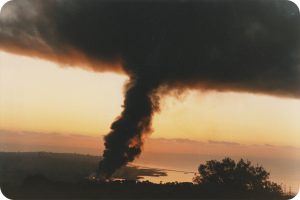
Content
explosion
Fire
Port
Container
Album
Theme
Ammonium Nitrate
Atmospheric
Atmospheric Pollution
Ecology
Energy
Environment
Explosion
Military
Weapon
Author
Pierre Malychef
Photograph of the Dora Port Explosion taken from Bsalim by ecotoxicologist, herbal pharmacologist and environmental activist Dr. Pierre Malychef on the morning of March 30th, 1989. For more information on the explosion, please go to: https://dark.society.systems/contribution/a-history-of-ammonia/
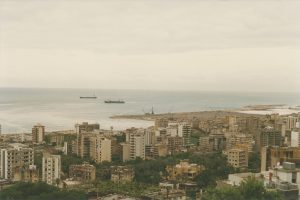
Media Type
Photograph
Container
Envelope
Theme
Land Reclamation
Author
Pierre Malychef
Land reclamation project in Dbayeh under development. Currently known as Waterfront City Dbayeh.

Media Type
Photograph
Content
Vegetation
Container
Envelope
Theme
Field Research
Landscape
Author
Pierre Malychef

Media Type
Photograph
Content
Barrel
Container
Album
Theme
Toxic Waste
Author
Pierre Malychef
Blue gallon containing residual products from chemical industries as indicated by their label that also reads in Spanish "M.L.S.A. via Puerto Cabello", a town in Venezuela. We couldn’t find more information around the sources, and whether they were related to the Italian toxic waste trade brought to Lebanon through a deal between the Italian mafia and Lebanese Forces. The image was taken by Pierre Malychef in the late 1980s.

Media Type
Photograph
Container
Envelope
Theme
Land Reclamation
Author
Pierre Malychef
Land reclamation project in Dbayeh under development. Currently known as Waterfront City Dbayeh.

Media Type
Photograph
Content
Beach
Powerplant
Container
Album
Theme
Electricity
Energy
Author
Pierre Malychef

Media Type
Photograph
Container
Envelope
Theme
Land Reclamation
Author
Pierre Malychef
Land reclamation project in Dbayeh under development. Currently known as Waterfront City Dbayeh.
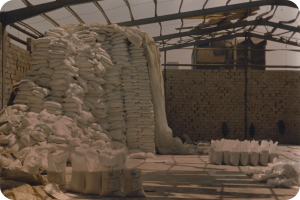
Media Type
Photograph
Container
Album
Theme
Ammonium Nitrate
Ammonium Sulfate
Damage
Ecology
Energy
Explosion
Military
War
Author
Pierre Malychef
Image taken by Dr. Pierre Malychef documenting the 1989 Dora Port Explosion and its aftermaths on March 30th 1989. A destitute hangar with a pressure-torn roof post-explosion. We see 5 frontal sacks with the same “Ammonium Sulfate, BASF, made in Germany” mark as in another image with a close up portrait view of one of the sacks, dfound in the same album. Similarly to Hangar 12, the hangar is filled with white sacks, akin to the ammonium nitrate sacks we all became familiar with in the last 3 years. For more information on the explosion, please go to: https://dark.society.systems/contribution/a-history-of-ammonia/

Media Type
Note(s)
Photograph
Container
Envelope
Theme
Quarry
Toxic Waste
Author
Pierre Malychef
Chnaniir gravel and sand quarry, May 1995. The earth is contaminated due to the storing of toxic waste in the quarry years before, making the extracted material unsuitable for building.

Media Type
Photograph
Container
Album
Theme
Ammonium Nitrate
Ammonium Sulfate
Atmospheric Pollution
Ecology
Energy
Environment
Military
Militia
War
Author
Pierre Malychef
Image taken by Dr. Pierre Malychef documenting the 1989 Dora Port Explosion and its aftermaths on March 30th 1989, showing a damaged hangars with sacks that other images found in the same album prove to be filled with ammonium nitrate and ammonium sulfate. For more information on the explosion, please go to: https://dark.society.systems/contribution/a-history-of-ammonia/

Author
Pierre Malychef
Image taken by Dr. Pierre Malychef documenting the 1989 Dora Port Explosion and its aftermaths on March 30th 1989. For more information on the explosion, please go to: https://dark.society.systems/contribution/a-history-of-ammonia/

Media Type
Photograph
Content
Powerplant
Sea
Container
Album
Theme
Electricity
Energy
Author
Pierre Malychef

Media Type
Image
Photograph
Reference
Content
Barrel
Container
Envelope
Theme
Toxic Waste
Author
Pierre Malychef

Media Type
Photograph
Content
Barrel
Container
Envelope
Theme
Field Research
Portrait
Toxic Waste
Author
Pierre Malychef
Inspection of toxic waste barrel.

Media Type
Photograph
Content
explosion
Fire
Port
Sea
Smoke
Container
Album
Theme
Atmospheric
Atmospheric Pollution
Damage
Discharge
Ecology
Energy
Environment
Explosion
Marine Pollution
Military
War
Author
Pierre Malychef
Image taken by Dr. Pierre Malychef documenting the 1989 Dora Port Explosion and its aftermaths on March 30th 1989. For more information on the explosion, please go to: https://dark.society.systems/contribution/a-history-of-ammonia/

Media Type
Photograph
Content
Media
Container
Envelope
Theme
Field Research
Portrait
Toxic Waste
Author
Pierre Malychef

Media Type
Photograph
Content
Quarry
Container
Envelope
Sub-envelope
Theme
Toxic Waste
Author
Pierre Malychef

Media Type
Photograph
Content
Smoke
Container
Folder
Sub-envelope
Theme
Landfill
Landscape
Author
Pierre Malychef

Media Type
Photograph
Container
Album
Author
Pierre Malychef
Image taken by Dr. Pierre Malychef documenting the 1989 Dora Port Explosion and its aftermaths on March 30th 1989. For more information on the explosion, please go to: https://dark.society.systems/contribution/a-history-of-ammonia/

Media Type
Photograph
Content
Port
Ship
Container
Folder
Sub-envelope
Theme
Toxic Waste
Author
Pierre Malychef
The ship Yvonne A docked at the fifth basin of the port of Beirut to be loaded with toxic waste barrels from the fake recuperation of Summer 1988. The ship, one out of four sent by the Italian embassy, was sunk before it reached Italy.

Media Type
Photograph
Container
Album
Author
Pierre Malychef
Image taken by Dr. Pierre Malychef documenting the 1989 Dora Port Explosion and its aftermaths on March 30th 1989. For more information on the explosion, please go to: https://dark.society.systems/contribution/a-history-of-ammonia/

Media Type
Photograph
Content
Barrel
Container
Album
Theme
Toxic Waste
Author
Pierre Malychef
The lid of a barrel with two duct tapes running over it labeled "RORER ITALIANA S.p.A." with the logo of RORER. The latter focuses on the production of organic fine chemistry, pharmaceuticals, machines, and macromolecular chemistry and polymers. The last patent published by the company was on April 2, 1987. Read more on: https://goodip.io/iq/assignee/rorer-italiana-spa#patents.
This lid ended up on Lebanese territories due the toxic waste deal between the Italian Mafia and the Lebanese Forces. This image was taken by Pierre Malychef in the late 1980s.
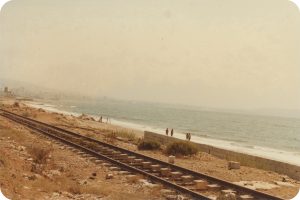
Media Type
Photograph
Content
Beach
Power Station
Railway
Container
Envelope
Theme
Electricity
Energy
Author
Pierre Malychef

Media Type
Photograph
Container
Envelope
Theme
Land Reclamation
Author
Pierre Malychef
Land reclamation project in Dbayeh under development. Currently known as Waterfront City Dbayeh.

Media Type
Photograph
Container
Album
Theme
Laboratory
Toxic Waste
Author
Pierre Malychef
Wilson Rizk testing samples of toxic waste in the lab.
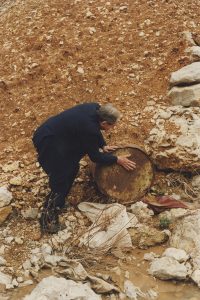
Media Type
Photograph
Content
Barrel
Container
Envelope
Theme
Field Research
Toxic Waste
Author
Pierre Malychef
Pierre Malychef examining a toxic waste barrel that is half-buried in the ground.
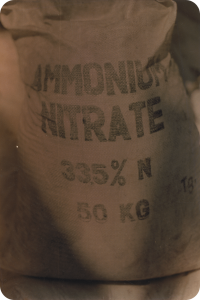
Media Type
Photograph
Container
Album
Theme
Ammonium Nitrate
Energy
Environment
Explosion
Military
War
Weapon
Author
Pierre Malychef
Image of a 50 KG sack of Ammonium Nitrate taken and developed by Dr. Pierre Malychef at the Dora Port, on March 30th 1989. For more information on the explosion, please go to: https://dark.society.systems/contribution/a-history-of-ammonia/

Media Type
Photograph
Container
Album
Theme
Symptom(s)
Toxic Waste
Author
Pierre Malychef
Documentation of symptoms resulting from exposure to toxic waste.

Media Type
Photograph
Content
Barrel
Container
Album
Theme
Toxic Waste
Author
Pierre Malychef
A symbol of "Harmful stow away from foodstuffs" on an orange barrel.
We couldn’t find more information around the sources, and whether they were related to the Italian toxic waste trade brought to Lebanon through a deal between the Italian mafia and Lebanese Forces. The image was taken by Pierre Malychef in the late 1980s.

Media Type
Photograph
Container
Envelope
Theme
Land Reclamation
Author
Pierre Malychef
Land reclamation project in Dbayeh under development. Currently known as Waterfront City Dbayeh.

Media Type
Photograph
Content
Barrel
Container
Album
Theme
Toxic Waste
Author
Pierre Malychef
Barrel lid from the Italian toxic waste trade discarded in a field in an unspecified location in Lebanon. The rusted lid reads, “…OTUNGRUPPE”.

Media Type
Photograph
Content
Powerplant
Smoke
Container
Album
Theme
Electricity
Energy
Author
Pierre Malychef
Black smoke rising from the Zouk Thermal Power Plant.
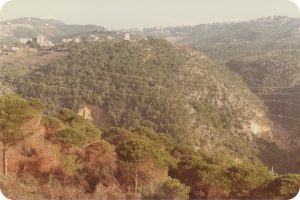
Media Type
Photograph
Content
Residential
Container
Envelope
Theme
Landscape
Quarry
Author
Pierre Malychef

Media Type
Image
Photograph
Reference
Content
Container
Port
Container
Envelope
Theme
Toxic Waste
Author
Pierre Malychef
Container of toxic waste at the port of Beirut.
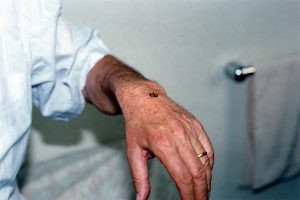
Media Type
Photograph
Container
Album
Theme
Symptom(s)
Toxic Waste
Author
Pierre Malychef
Documentation of symptoms resulting from exposure to toxic waste.

Media Type
Photograph
Container
Envelope
Theme
Land Reclamation
Author
Pierre Malychef
Land reclamation project in Dbayeh under development. Currently known as Waterfront City Dbayeh.

Media Type
Photograph
Container
Album
Author
Pierre Malychef
Image taken by Dr. Pierre Malychef documenting the 1989 Dora Port Explosion and its aftermaths on March 30th 1989. For more information on the explosion, please go to: https://dark.society.systems/contribution/a-history-of-ammonia/

Media Type
Photograph
Container
Album
Author
Pierre Malychef
Image taken by Dr. Pierre Malychef documenting the 1989 Dora Port Explosion and its aftermaths on March 30th 1989. For more information on the explosion, please go to: https://dark.society.systems/contribution/a-history-of-ammonia/

Media Type
Photograph
Content
Barrel
Media
Container
Envelope
Theme
Field Research
Toxic Waste
Author
Pierre Malychef
Inspection and media coverage of toxic waste found in ʿOyūn el-Sīmān.

Media Type
Photograph
Content
Electric Pole
Container
Envelope
Theme
Electricity
Energy
Public Works
Author
Pierre Malychef

Media Type
Photograph
Content
Barrel
Container
Album
Theme
Toxic Waste
Author
Pierre Malychef
A can of knifing polyester putty (as the label indicates in Italian), produced by Ponte Chiasso (Como), the Italian subsidiary of the German paint company, Lechler. Ponte Chiasso gained its independence from its parent company, Lechler, in 1910. This can ended up on Lebanese territories due the toxic waste deal between the Italian Mafia and the Lebanese Forces. This image was taken by Pierre Malychef in the late 1980s.
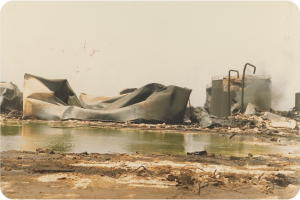
Media Type
Photograph
Content
Cistern
explosion
Port
Sea
Smoke
Container
Album
Theme
Ammonium Nitrate
Atmospheric
Atmospheric Pollution
Damage
Discharge
Ecology
Energy
Environment
Military
Pollution
Toxic
Water
Author
Pierre Malychef
Image from the same roll of film taken and developed by Dr. Pierre Malychef showing molten oil tanks after they exploded on March 30th 1989 at the Dora Port. Smoke is still fuming and a murky water fills the ashen ground of the port. For more information on the explosion, please go to: https://dark.society.systems/contribution/a-history-of-ammonia/
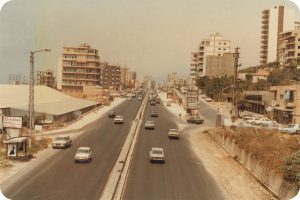
Media Type
Photograph
Content
Highway
Power Station
Residential
Vehicle
Container
Envelope
Theme
Electricity
Energy
Industry
Author
Pierre Malychef

Media Type
Photograph
Content
Barrel
Container
Album
Theme
Toxic Waste
Author
Pierre Malychef
Silver barrels of "Alkydal F 22 tix" with a ratio of 60% Xylol (according to the label). It was produced in Germany by the German multinational and pharmaceutical company, Bayer. Alkyd resins are used in the formulation of wood and furniture coatings, parquet and floor coatings, exterior wood coatings, DIY and painter coatings as well as industrial coatings. We couldn’t find more information around the sources, and whether they were related to the Italian toxic waste trade brought to Lebanon through a deal between the Italian mafia and Lebanese Forces. The image was taken by Pierre Malychef in the late 1980s.
